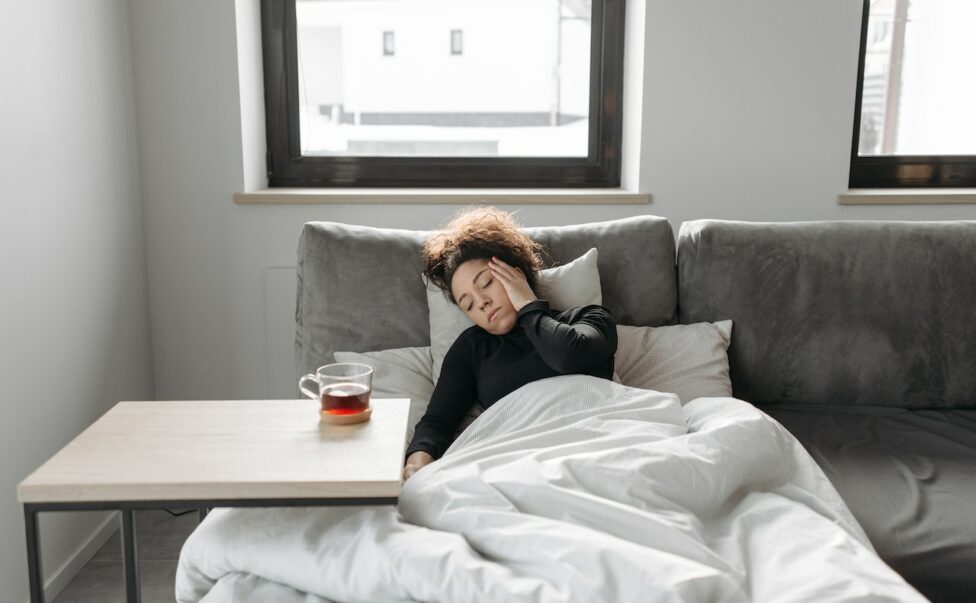Top Reasons You Might Be Getting Sleep Headaches
More than 25 million Americans report that they wake up frequently with a headache. The National Library of Medicine says 1 in 13 people suffer from “morning headaches,” also called “sleep headaches.”
What causes this irritating but sometimes debilitating condition, and what can be done about it?
There is no single cause of sleep headaches. It can be one thing or a number of factors. Sleep headaches may be the result of internal biochemical or physiological disorders in some people – while in many others, the headaches are caused by habits and poor lifestyle choices.
Common Causes
Sleep Apnea
This is also called obstructive sleep apnea because it denotes processes that block sleepers from breathing properly at night. Sometimes people literally stop breathing for short periods. This means less oxygen to the brain, and that causes headaches.
Experts say that from 2% to 9% of the population experience sleep apnea routinely. Thus, it does not account for all sleep headaches but explains a good portion of them.
Insomnia
Insomnia affects 70 million Americans per year, according to sleep specialists at the Cleveland Clinic. That’s 33% up to 50% of the population. Insomnia is a problem with multiple causes, but for our purposes here, it can be said to contribute to morning headaches. If you can successfully treat insomnia, sleep headaches may be eliminated as well.
Lack of Delta Sleep
Sleep researchers have long known that the brain transitions through four distinct phases of sleep. While that is happening, EEG measures show that the brain also displays different wave amplitudes.
The five brain wave amplitudes are alpha, beta, delta, gamma and theta waves. Alpha is basically when you are still awake but are feeling very relaxed. As you pass into sleep, alpha waves give way to beta waves, and so on.
Slow wave delta sleep is the “deep bottom” of sleep brain wave activity. Studies with subjects in sleep labs have shown that some people experience disruptions in achieving delta sleep –- the deepest sleep.
Thus, even though some people may “feel” like they slept because they went through beta, gamma and theta wave sleep, if they were disrupted during the delta phases, the result could be an array of symptoms, from daily fatigue to morning headaches.
Circadian Rhythm Disorder
When a person’s body gets out of sync with regular sleep-to-wake rhythms, it may be Circadian Rhythm Sleep Disorder. Briefly, all human bodies have a natural “internal clock” that has a 24-hour cycle. This clock tells you when it is time to be awake and when it’s time to be asleep. The amount of sunlight and darkness a person receives helps regulate the Circadian rhythm.
When this gets out of balance, normal sleep patterns are disrupted, and one outcome may be sleep headaches. Sleep specialists can help people “reset” their internal sleep-to-wake clock.
Sleeping Too Much
If you get too little sleep, the result can be headaches. If you sleep too much, that also can cause headaches. Experts with the Midwest Pain Clinic say that oversleeping can lead to dehydration and the depletion of essential nutrients that feed the brain and body. At the same time, sleep experts admit that oversleeping headaches are not well understood. The key is to get enough sleep – 7 to 9 hours – but not more.
Teeth Grinding
Also called “bruxism,” some people grind their teeth while they sleep. This is well-connected with headaches upon awakening. A common solution is to wear a mouth guard at night, but doctors may also treat bruxism with medications. Bruxism is associated with psychological components, such as daily anxiety and stress. Cognitive behavior therapy is among the most common psychological treatments for teeth grinding.
Medications and Other Substances
It’s common knowledge that drinking alcohol, especially in excess, can cause a hangover. But a small amount of alcohol, such as one beer or glass of wine, may easily contribute to a morning or sleep headache.
That said, there are numerous prescription drugs that have been associated with sleep headaches. Opioids, for example, are powerful pain killers, but they can severely disrupt sleep. However, even aspirin and Tylenol (or any NSAID) can cause a “bounce-back” headache upon awakening, even if these drugs relieve a headache before bedtime.
We’ve touched upon some of the most common sleep headache culprits, but there are many more. Sleep headaches are a complex problem that can have multiple causes. If this is a persistent problem for you, seeking professional help may be the best way to seek relief.

